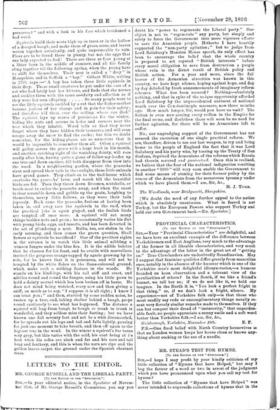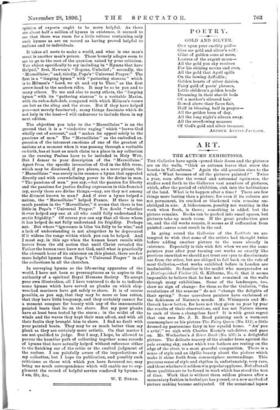MR. STEAD'S TEST FOR HYMNS.
E.TO TEM EDITOR OP THE " SPECTATOR.")
SIR,—I hope I may profit by your kindly criticism of my little collection of "Hymns that have Helped," but may I beg the favour of a word or two in arrest of the judgment which you have pronounced upon what you call my test for hymns ?
The little collection of "Hymns that have Helped" was never intended to supersede collections of hymns that in the
opinion of experts ought to be more helpful. As there are about half a million of hymns in existence, it seemed to me that there was room for a little volume containing only such hymns as are on record as having proved helpful to nations and to individuals.
It takes all sorts to make a world, and what is one man's meat is another man's poison. These homely adages seem to me to go to the root of the question raised by your criticism. You object specifically to my including in "Hymns that have Helped," first, Newton's "Begone, Unbelief ; " secondly, the
Marseillaise;" and, thirdly, Pope's" Universal Prayer." The first is a "limping hymn" with "pattering stanzas" which is to Milman's "Lord, we sit and cry to Thee," as the first arrow-head to the modern rifles. It may be so to you and to many others. To me and also to many others, the "limping hymn" with its "pattering stanzas" is a veritable Maxim, with its rub-a-dub-dub, compared with which Milman's verses are but as the sling and the stone. But if they have helped you—not merely fascina4-ed ; many things fascinate which do not help in the least—I will endeavour to include them in my 'next edition.
The objection you take to the " Marseillaise " is on the ground that it is a "vindictive raging" which "leaves God wholly out of account," and "makes its appeal solely to the passions of men." The "Marseillaise" as the embodied ex- pression of the intensest emotions of one of the greatest of -nations at a moment when it was passing through a veritable re-birth, has at least as much claim to a place in my collection
• as the cursing Psalms have to be included in Holy Writ. Ent I demur to your description of the "Marseillaise." Apart from the specific invocation of God in the fifth verse, which may be dismissed, if you please, as a mere phrase, the 4' Marseillaise " was surely in its essence a hymn that appealed directly and with overwhelming power to the divine in man. "The passions of men" you say,—but the passion for liberty -and the passions for justice finding expression in this frenzied cry, surely these are divine things,—nay, are they not among -the divmest known to man P And if ever a hymn helped a nation, the "Marseillaise" helped France. If there is too much passion in the "Marseillaise," it seems that there is too little in Pope's "Universal Prayer." You doubt "whether it ever helped any one at all who could fully understand its -arctic frigidity." Of course you can say that all those whom it has helped do not fully understand its frigidity. Perhaps not. But where "ignorance is bliss 'tis folly to be wise," and a lack of understanding is not altogether to be deprecated if it widens the range within which you can be helped. And I must say, in this age when the human heart recoils with horror from the old notion that until Christ revealed the Father the human race knew not God, until what is practically -the eleventh hour of its existence on this planet, there are few more helpful hymns than Pope's "Universal Prayer" in all the collections in all the churches.
In surveying hymns as the life-saving apparatus of the • world, I have not been so presumptuous as to aspire to the authority of a spiritual Royal Humane Society. To accept your own illustration, all I have ventured to do is to indicate some hymns which have served as planks on which ship- wrecked mariners have got safely to shore. It is of course possible, as you say, that they may be more or less rotten, that they have little buoyancy, and they certainly cannot for -a moment compare for beauty with any of the innumerable painted boats that lie on the shore. But my poor planks have at least been tested by the storm ; in the midst of the winds and the waves they kept their man afloat, and with all their faults they brought him to shore. I find no fault with your painted boats. They may be as much better than my plank as they are certainly more artistic. On that matter I am not qualified to judge. But I may, I hope, be allowed to pursue the humbler path of collecting together some records -of hymns that have actually helped without reference either to the finicking ear of the critic or the exalted judgment of the recluse. I am painfully aware of the imperfections of my collection, but I hope its publication, and possibly such criticisms as those with which you have favoured me, may bring me much correspondence which will enable me to sup- plement the record of helpful service rendered by hymns.— I am, Sir, &c., W. T. STEAD.











































 Previous page
Previous page